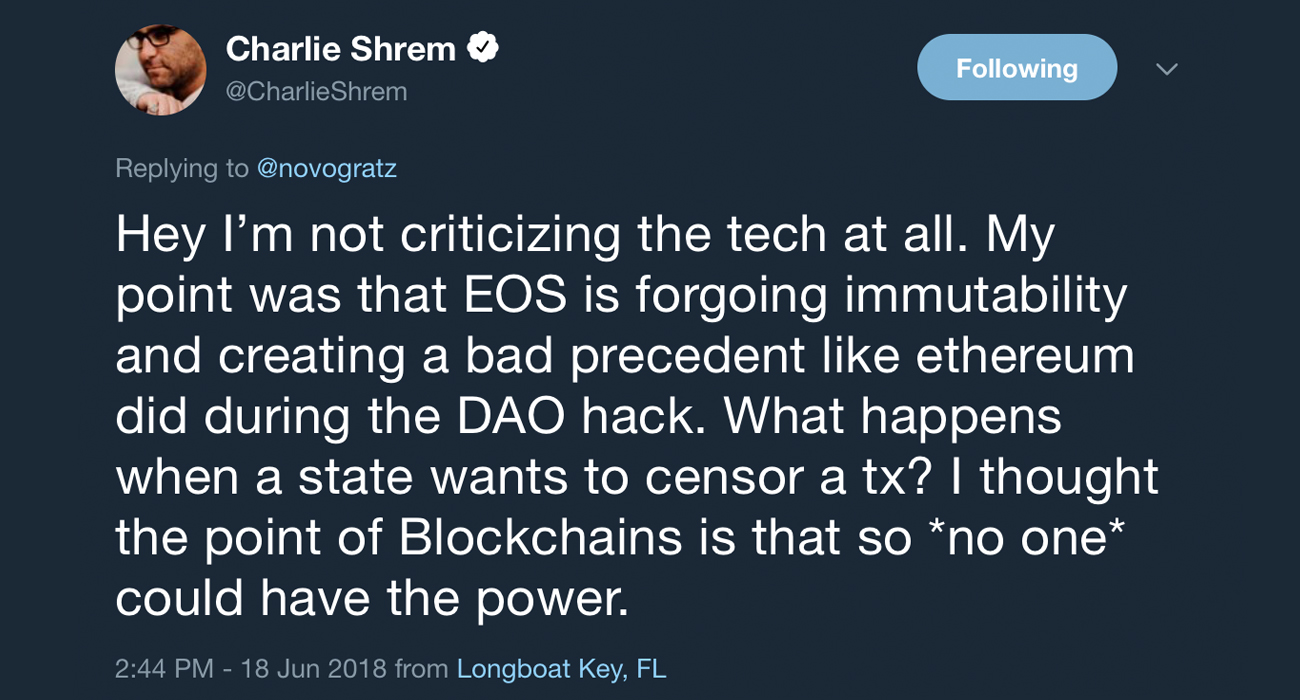
On June 17, 2018, the 21 block producers or nodes that run the EOS network chose to freeze seven accounts that were allegedly stolen from EOS community members. According to reports, all 21 block producers unanimously decided to freeze the compromised assets but the decision was met with controversy from the EOS community, and possibly some second thoughts from the block producer EOS New York.
Also Read: Ripple Gateways Can Freeze Users’ Funds at Any Time
EOS Block Producers Unanimously Decide to Freeze Accounts
 The decision made by EOS block producers brings a lot of questions to the table again in regard to whether or not a public blockchain that has centralized nodes with freezing powers can truly be considered a permissionless blockchain. On June 17, the 21 EOS block producers (BP) had agreed unanimously to freeze several accounts on the EOS blockchain that were allegedly stolen. According to the BP members and the EOS911 (a system that shows if EOS keys were compromised), malicious actors using phishing attacks and other forms of social engineering were able to steal people’s keys. Seven accounts have been frozen even though there seems to be more complaints of compromised keys to hand.
The decision made by EOS block producers brings a lot of questions to the table again in regard to whether or not a public blockchain that has centralized nodes with freezing powers can truly be considered a permissionless blockchain. On June 17, the 21 EOS block producers (BP) had agreed unanimously to freeze several accounts on the EOS blockchain that were allegedly stolen. According to the BP members and the EOS911 (a system that shows if EOS keys were compromised), malicious actors using phishing attacks and other forms of social engineering were able to steal people’s keys. Seven accounts have been frozen even though there seems to be more complaints of compromised keys to hand.
EOS New York Shows Reluctance
Even though all 21 BPs chose to unanimously vote to freeze these accounts, EOS New York has written that even though they voted on enacting the account blacklist, the organization wavered on the decision.
“EOS New York chose to enact this freeze because we believed that we were following the spirit of the governance system we as a community seek to create, despite it being formally absent. EOS is a platform meant to enable solutions which protect life, liberty, and property and that’s what we believed we were doing through this emergency action,” the New York-based BP noted.
However, EOS New York stated that if this continues to happen they may not be so supportive unless the state of the network was in critical need of the blacklisting solution again.
We are encountering these problems on a daily basis and we do not have the tools in place to properly address them.
Other Well-Known Chains with the Ability to Freeze Accounts
The decision was controversial among EOS participants and the cryptocurrency community in general to say the least as the topic erupted into debates about centralized chains and immutability once again. Many people are skeptical that a blockchain with centralized nodes with freezing abilities can even be called ‘decentralized’. The third highest valued cryptocurrency network held by Ripple (XRP) has also been accused of the same freezing process multiple times in the past.

Furthermore, the EOS blacklisting took place not long after the network was officially launched last week when the 21 BPs voted to initiate the chain, but then had critical issues with block production shortly after the launch. The EOS chain and concept has been on the hype train ever since its inventor Dan Larimer (also the creator Bitshares and Steemit) announced the protocol, leading to the token’s market capturing the fifth highest market cap.
What do you think about the EOS block producers’ ability to blacklist and freeze accounts? Let us know what you think about this subject in the comment section below.
Images via Pixabay, Disney’s Frozen, the XRP and EOS logo, and Wiki Commons.
Verify and track bitcoin cash transactions on our BCH Block Explorer, the best of its kind anywhere in the world. Also, keep up with your holdings, BCH, and other coins, on our market charts at Satoshi’s Pulse, another original and free service from Bitcoin.com.
The post EOS Decentralization Questioned as Block Producers Freeze Accounts appeared first on Bitcoin News.
Powered by WPeMatico

